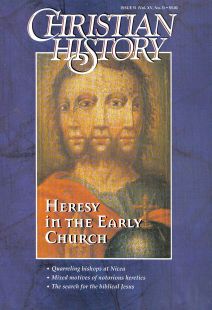Origen: Model or Heretic?
ORIGEN OF ALEXANDRIA, a third-century Christian scholar, loved Jesus, the Scriptures, and Neo-Platonic philosophy—a combination that Christians since have viewed as either the height of faithful theology or the depth of horrendous error.
Whatever one’s views of his theology, his life was utterly dedicated to Christ. In his boyhood, when a persecution struck Alexandria hard, he wanted to rush to be martyred. Only a ruse by his mother—who hid his clothes—prevented his leaving the house! Later in life, the church historian Eusebius reported, he castrated himself in literal obedience to Matthew 19:12. And in 250, during the violent persecution of Decius, he was imprisoned and tortured so severely that he never recovered.
On the other hand, though praised by many, he was rejected by his bishop. Origen’s most orthodox admirers, like Gregory of Nyssa, often rejected his teachings. Later some thought Origen was a devil. Theologians today still debate the orthodoxy of his views.
Pushing the Boundaries
At the root of these controversies is Origen’s use of the Bible. Neo—Platonism taught that physical objects acted as symbols of spiritual reality and so contained a double meaning. Likewise, Origen and many other Christians (like Augustine) believed the Scriptures had a double meaning; the spiritual significance, while escaping the notice of most people, could be contemplated by the perfected Christian. But Origen’s interpretations pushed the boundaries of orthodoxy.
He believed, for instance, in the pre-existence of souls and that eventually everyone, including the Devil, would be saved. In addition, he described the Trinity as a hierarchy, not as an equality of Father, Son, and Spirit. Though Origen attacked Gnosticism, in many ways, like the Gnostics, he rejected the goodness of the material creation. His critics have always complained that in many ways this teacher was “blinded by Greek culture.”
A Man of Christ
Yet Origen said, “I want to be a man of the church . . . to be called . . . of Christ.” His Contra Celsum, a defense of Christianity, helped Christians endure physical and intellectual persecution. HisHexapla (now destroyed), a comparison of various ancient biblical texts, was an important step in the development of the biblical canon.
The contradictions in Origen are due in great part to his genius as well as the cultural tensions he faced. On the one hand, he presented a creative defense of Christianity and brought Christianity to Roman elites. On the other hand, his genius led him down some dubious paths. In short, he faced the tensions of every Christian: to be both relevant to, and separate from, the world.
By Kenneth R. Calvert
[Christian History originally published this article in Christian History Issue #51 in 1996]
Kenneth R. Calvert of Hillsdale College, Michigan.Next articles
Hudson Taylor & Missions to China: Did You Know?
Remarkable or little-known facts about Hudson Taylor and missions to China.
Samuel H. ChaoFrom the Editor — Surprised by China
This issue quickly got out of control as we discovered more and more fascinating aspects of Taylor’s life and mission.
Mark GalliSupport us
Christian History Institute (CHI) is a non-profit Pennsylvania corporation founded in 1982. Your donations support the continuation of this ministry
Donate



